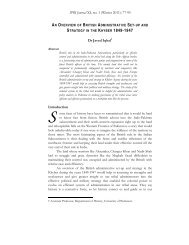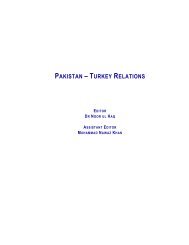120 Whither Kashmir? (Part II) - Islamabad Policy Research Institute
120 Whither Kashmir? (Part II) - Islamabad Policy Research Institute
120 Whither Kashmir? (Part II) - Islamabad Policy Research Institute
Create successful ePaper yourself
Turn your PDF publications into a flip-book with our unique Google optimized e-Paper software.
<strong>Whither</strong> <strong>Kashmir</strong>?<br />
Burton was speaking at a Congressional hearing convened by<br />
Ackerman on “Building a Strategic <strong>Part</strong>nership: US-India Relations in the<br />
Wake of Mumbai.”<br />
An outspoken critic of India’s human rights record for past several<br />
years now, Burton, said, “Solving the <strong>Kashmir</strong> problem will not likely<br />
make the terrorist groups operating on and from <strong>Kashmir</strong> lay down their<br />
arms but it will, I believe, eliminate their ability to use the human rights<br />
situation in <strong>Kashmir</strong>”.<br />
He further said, “I personally believe that the people of <strong>Kashmir</strong><br />
should be given the plebiscite that they were promised by the United<br />
Nations decades ago. Regardless of the shape of the ultimate resolution,<br />
this situation someday be addressed and the sooner the better”.<br />
Sana online, March 2, 2010.<br />
http://www.sananews.com.pk/english/2009/03/02/us-cong-man-favoursplebiscite-in-kashmir/<br />
DEADLOCK IN PAKISTAN-INDIA TALKS<br />
Once again Pakistan-India talks have become the victim of a deadlock as<br />
is quite apparent from the result of our foreign secretary’s visit to India<br />
last week. A deadlock in Pakistan-India talks is nothing extraordinary. In<br />
fact, if one looks at the history of Pakistan-India relations, it has been a<br />
common feature of this complex and difficult relationship. The only<br />
thing which is different this time is that the bilateral talks in substantive<br />
terms have been deadlocked even before they could begin. This speaks<br />
volumes about the current status of Pakistan-India relations mired as they<br />
are in mutual mistrust, grievances and animosity.<br />
It was quite clear after the three-hour talks between the two foreign<br />
secretaries in New Delhi on February 25 that the positions of the two<br />
countries were far apart. In fact, Foreign Secretary Salman Bashir, while<br />
talking to the Pakistani media after the talks, remarked that the gap<br />
between the two countries was widening. India’s focus during the talks<br />
was on the issue of terrorism on which it handed over two dossiers to the<br />
Pakistani foreign secretary demanding the arrest and handing over by<br />
Pakistan of the founder of Lashkar-i-Taiba, Hafiz Saeed, and seven other<br />
operatives besides some Indian mujahideen and Khalistan militants. India<br />
expressed its inability to recommence the composite dialogue without the<br />
“unravelling of the full conspiracy” behind the Mumbai terrorist attack.<br />
Even before the talks began, Indian Foreign Secretary Nirupama Rao told<br />
51




